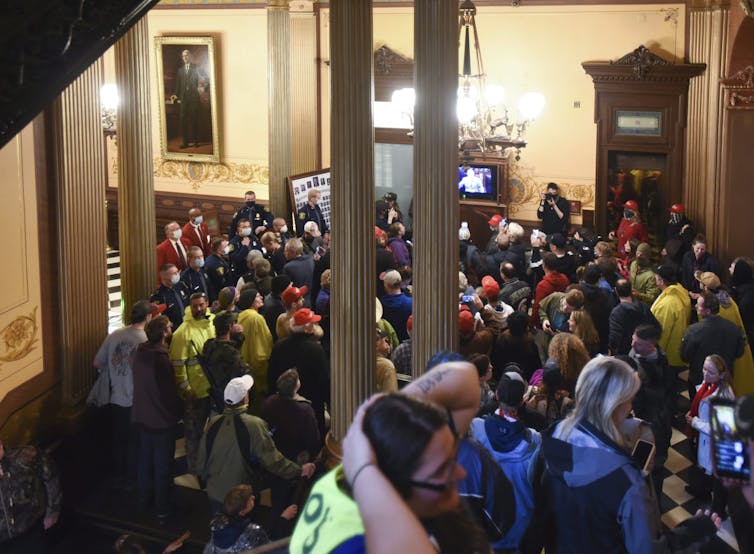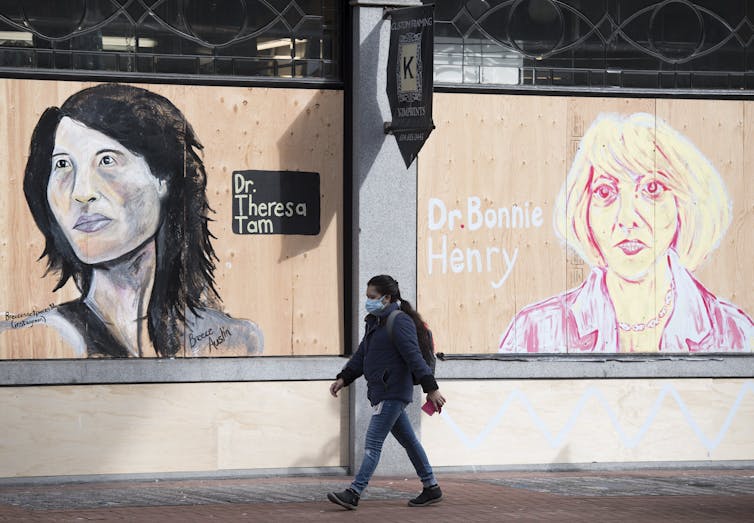As the world fights the novel coronavirus pandemic, our strongest weapon right now is physical distancing. Proven by studies and supported by history, staying home save lives.

In fact, bending this rule to meet even a few other people may undo our efforts.
While many have accepted the safety directions, some are still travelling. More people have died of COVID-19 in the United States than any other country, yet U.S. President Donald Trump has encouraged people to gather and Georgia’s governor supported the reopening of bowling alleys and nail salons. So why is it so hard for us to do what is right?
READ MORE: As coronavirus drags on, more Canadians ditch physical-distancing rules: Ipsos poll
Subconscious biases affect our behaviour
As a doctor and a father, I get that we are all trying to keep a sense of normalcy for ourselves and our families. But the reasons we resist distancing are often beyond rationality: there are reflexive thoughts that drive our behaviour, often without our own awareness. And if we want to save as many lives as possible, our efforts have to take these subconscious biases into account.
For example, asking people to observe physical distancing may actually have the opposite effect for those who fear that compliance will lead to a restriction in their freedom. This is called reactance bias, and it is partly why in our society teenagers drink alcohol and some drivers resist seatbelts.

It is also why pandemic safety measures can be easily framed as a restrictive “lockdown” and why the U.S. president can incite people to unsafely meet up in order to “liberate” their state. Given how quickly and passionately protesters follow populist leaders, it is not surprising that many of the same bad actors seen in anti-science campaigns against vaccination and climate change are again preying on swift emotions like fear and disgust to manipulate us into acting before we think.
Another way our minds mislead us is that we judge ourselves differently than we judge others. When we trip it is because the ground is uneven; others misstep due to clumsiness. Two-thirds of people say they are better than average drivers. We all need some esteem to allow us to feel capable in life, but the flip side of this self-centredness is that we downplay the risks of daily grocery trips or play dates because, well, it’s us.

Get breaking National news
But the novel coronavirus does not differentiate between us and others, good or bad, our tribe or not. So although some people are more susceptible to serious complications, many otherwise young and healthy people have died from COVID-19. We just don’t think we’ll become one of “those people.”
WATCH BELOW: An Ipsos poll released May 17 shows more Canadians likely to shop, eat out than attend sporting event or concert

The tales we tell
Stories, whether tales or in pictures, are also important in understanding our behaviour since we are wired to remember them much more than numbers. Dry statistics of deaths in Asia or Europe are difficult to comprehend because our brains cannot emotionally connect.
But stories are memorable and become compelling when they evoke basic emotions such as happiness, sadness and fear. The heartbreaking image of three-year-old Alan Kurdi’s body lying on a Turkish beach is unforgettable, and elicited a much greater reaction than reports of Syria’s attacks on its citizens. Recently, Dr. Anna Carvalho’s decision to isolate from her family included a photograph of her children waving through their aunt’s window, making the plea to physically distance more real and immediate — factors that nudge us towards action.

Science fiction author Robert A. Heinlein wrote, “Don’t appeal to man’s better nature — he may not have one.” More accurately, hundreds of cognitive biases such as those discussed here greatly affect the decisions we make, sometimes to our detriment. So if we are to change behaviour during this pandemic we must address both the rational and subconscious ways our minds work.
READ MORE: As coronavirus spreads, Trump lashes out at science that contradicts him
Effective communication
In order to build trust, leaders must be humble and honest. Familiar and regular communications from leaders like Drs. Bonnie Henry and Theresa Tam and Prime Ministers Trudeau and Ardern can have positive effects. Pro-science messages from diverse influencers like Hayley Wickenheiser, Ryan Reynolds, Chris Hadfield and Michael Bublé have resonated. And we need stories, lots of them, of the front-line workers risking their safety.
In turn, we must attempt to slow down and process our emotions and consider that bending the rules endangers others and lengthens the time of distancing restrictions. For those whose opinions have become part of their own self-identity, no fact will likely change their behaviour. Some personal liberties may have to be restricted for the greater good in the same way we legislate sobriety for drivers and helmets for cyclists.
Containing the COVID-19 pandemic will require more than the heroic measures of our front-line workers: we must all make difficult sacrifices. Success will not be easy, but to save lives we must take into account the hidden ways our brains work. We must use strategies that represent more reasoned logic than we tend to rely on, left to our own devices.Eric Cadesky, Clinical Associate Professor, Faculty of Medicine, University of British Columbia
This article is republished from The Conversation under a Creative Commons license. Read the original article.








Comments
Want to discuss? Please read our Commenting Policy first.